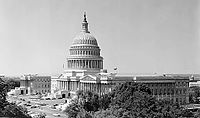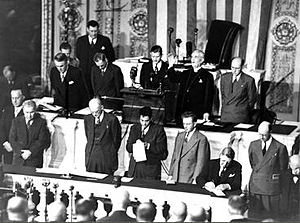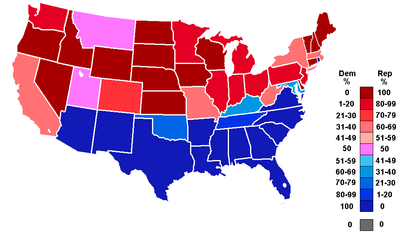- 80th United States Congress
-
80th United States Congress 
United States Capitol (1956)Duration: January 3, 1947 – January 3, 1949 Senate President: Vacant Senate Pres. pro tem: Arthur H. Vandenberg House Speaker: Joseph William Martin, Jr. Members: 96 Senators
435 Representatives
3 Non-voting membersSenate Majority: Republican Party House Majority: Republican Party Sessions 1st: January 3, 1947 – December 19, 1947
Special: November 17, 1947 – December 19, 1947
2nd: January 6, 1948 – December 31, 1948
Special: July 26, 1948 – August 7, 1948<79th 81st> The Eightieth United States Congress was a meeting of the legislative branch of the United States federal government, composed of the United States Senate and the United States House of Representatives. It met in Washington, DC from January 3, 1947 to January 3, 1949, during the third and fourth years of Harry S. Truman's presidency. The apportionment of seats in this House of Representatives was based on the Sixteenth Census of the United States in 1940. Republicans gained a majority in both chambers for this Congress. The Democrats had the majorities in the previous Congress and they regained them back in the next Congress.
The 80th Congress was nicknamed the "Do Nothing Congress" by President Harry Truman. The Congress opposed many of the bills passed during the Franklin Roosevelt administration. They also opposed most of Truman's Fair Deal bills. Yet they passed many pro-business bills. During the 1948 election Truman campaigned as much against the "Do Nothing Congress" as against his formal opponent, Thomas Dewey.
Major events
 The 1947 HUAC hearings in session. On the right, standing with his hand raised, is committee chairman J. Parnell Thomas; congressman Richard Nixon is seated immediately to Thomas's left.
The 1947 HUAC hearings in session. On the right, standing with his hand raised, is committee chairman J. Parnell Thomas; congressman Richard Nixon is seated immediately to Thomas's left. See also: 1947 in the United States, 1948 in the United States, and 1949 in the United States
See also: 1947 in the United States, 1948 in the United States, and 1949 in the United States- January 3, 1947: Proceedings of Congress were televised for the first time.
- March 12, 1947: In a Joint Session of Congress, President Truman proclaimed the Truman Doctrine.
- July 18, 1947: The Trust Territory of the Pacific Islands entered into a trusteeship with the United Nations and administered by the United States.
- July 20, 1947: President Truman issued the second peacetime military draft in the United States amid increasing tensions with the Soviet Union.
- November 24, 1947: The House of Representatives approved citations of contempt of Congress against the so-called Hollywood 10.
- July 26, 1948: President Truman signed Executive Order 9981, ending racial segregation in the United States Armed Forces.
- August 25, 1948: House Un-American Activities Committee held the first-ever televised congressional hearing: "Confrontation Day" between Whittaker Chambers and Alger Hiss.
- November 2, 1948: United States general elections, 1948:
- Presidential election: Harry Truman defeated Thomas Dewey and Strom Thurmond;
- Democrats regained control of the Senate and the House of Representatives
Major legislation
Main article: List of United States federal legislation, 1901-2001#80th United States Congress- May 22, 1947: Assistance to Greece and Turkey Act (Truman Doctrine), Sess. 1, ch. 81, Pub.L. 80-75,
- June 23, 1947: Taft–Hartley Act, Sess. 1, ch. 120, 61 Stat. 136
- July 26, 1947: National Security Act of 1947, Sess. 1, ch. 343, 61 Stat. 495
- August 7, 1947: Mineral Leasing Act for Acquired Lands, Sess. 1, ch. 513, 61 Stat. 913
- January 27, 1948: United States Information and Educational Exchange Act, Sess. 2, ch. 36, 62 Stat. 6
- April 3, 1948: Foreign Assistance Act (Marshall Plan), Pub.L. 80-47, Sess. 2, ch. 169, 62 Stat. 137
- April 3, 1948: Greek-Turkish Assistance Act of 1948, Sess. 2, ch. 169, Pub.L. 80-75, title III, 62 Stat. 157
- May 26, 1948: Civil Air Patrol Act, Pub.L. 80-557, 62 Stat. 274
- June 17, 1948: Reed-Bulwinkle Act
- June 25, 1948: Presidential Succession Act, Sess. 2, ch. 644, Pub.L. 89-174, 62 Stat. 677
- June 28, 1948: Commodity Credit Corporation Charter Act of 1948
- June 30, 1948: Federal Water Pollution Control Act, Sess. 2, ch. 758
- July 3, 1948: War Claims Act of 1948, Pub.L. 80-896, 62 Stat. 1240
- 1948: Agricultural Act of 1948
Constitutional provisions
- March 21, 1947: Twenty-second Amendment to the United States Constitution proposed
Party summary
 House Chaplain Bernard Braskamp delivering the opening prayer for the 80th Congress, 1947
House Chaplain Bernard Braskamp delivering the opening prayer for the 80th Congress, 1947
Senate
From the beginning to the end of this Congress, there was no net change in party power.
Affiliation Party (Shading indicates majority caucus)Total Republican Democratic Progressive Vacant End of previous Congress 38 57 1 96 0 Begin 51 45 0 96 0 End Final voting share 53.1% 46.9% 0.0% Beginning of the next Congress 42 54 0 96 0 House of Representatives
From the beginning to the end of this Congress, there was no net change in party power. The Democrats lost one seat, which remained vacant until the next Congress.
Affiliation Party (Shading indicates majority caucus)Total Republican Democratic American Labor Progressive Vacant End of previous Congress 191 242 1 1 435 0 Begin 248 185 1 0 434 1 End 244 184 2 430 5 Final voting share 56.7% 43.1% 0.2% 0.0% Beginning of the next Congress 171 263 1 0 435 0 Leadership
[ Section contents: Senate: Majority (R), Minority (D) • House: Majority (R), Minority (D) ]
Senate
- President: Vacant
- President pro tempore: Arthur Vandenberg (R)
Majority (Republican) leadership
- Majority leader: Wallace White
- Majority whip: Kenneth Wherry
Minority (Democratic) leadership
- Minority leader: Alben Barkley
- Minority whip: Scott Lucas
House of Representatives
- Speaker: Joseph Martin (R)
Majority (Republican) leadership
- Majority Leader: Charles Halleck
- Republican Whip: Leslie Arends
- Republican Conference Chairman: Roy O. Woodruff
Minority (Democratic) leadership
- Minority Leader: Sam Rayburn
- Democratic Whip: John McCormack
- Democratic Caucus Chairman: Aime Forand
Members
Senate
Senators are popularly elected statewide every two years, with one-third beginning new six year terms with each Congress. Preceding the names in the list below are Senate class numbers, which indicate the cycle of their election.
Alabama
- 2. John J. Sparkman (D)
- 3. Joseph Lister Hill (D)
Arizona
- 1. Ernest W. McFarland (D)
- 3. Carl Hayden (D)
Arkansas
- 3. J. William Fulbright (D)
- 2. John Little McClellan (D)
California
- 1. William F. Knowland (R)
- 3. Sheridan Downey (D)
Colorado
- 3. Eugene D. Millikin (R)
- 2. Edwin Carl Johnson (D)
Connecticut
- 3. Brien McMahon (D)
- 1. Raymond E. Baldwin (R)
Delaware
- 2. C. Douglass Buck (R)
- 1. John J. Williams (R)
Florida
- 1. Spessard Holland (D)
- 3. Claude Denson Pepper (D)
Georgia
- 2. Walter Franklin George (D)
- 3. Richard Brevard Russell (D)
Idaho
- 2. Henry Dworshak (R)
- 3. Glen H. Taylor (D)
Illinois
- 3. Scott W. Lucas (D)
- 2. Charles W. Brooks (R)
Indiana
- 1. William E. Jenner (R)
- 3. Homer E. Capehart (R)
Iowa
- 3. Bourke B. Hickenlooper (R)
- 2. George A. Wilson (R)
Kansas
- 2. Arthur Capper (R)
- 3. Clyde M. Reed (R)
Kentucky
- 3. Alben William Barkley (D)
- 2. John Sherman Cooper (R)
Louisiana
- 2. Allen Joseph Ellender (D)
- 3. John Holmes Overton (D), until May 14, 1948
- William C. Feazel (D), May 18, 1948 – December 30, 1948
- Russell B. Long (D), from December 31, 1948
Maine
- 1. Ralph Owen Brewster (R)
- 2. Wallace H. White, Jr. (R)
Maryland
- 1. Herbert O'Conor (D)
- 3. Millard Evelyn Tydings (D)
Massachusetts
- 2. Leverett Saltonstall (R)
- 1. Henry Cabot Lodge, Jr. (R)
Michigan
- 2. Homer Ferguson (R)
- 1. Arthur Hendrick Vandenberg (R)
Minnesota
- 2. Joseph H. Ball (R)
- 1. Edward John Thye (R)
Mississippi
- 1. Theodore Gilmore Bilbo (D), until August 21, 1947
- John C. Stennis (D), from November 17, 1947
- 2. James O. Eastland (D)
Missouri
- 3. Forrest C. Donnell (R)
- 1. James P. Kem (R)
Montana
- 2. James Edward Murray (D)
- 1. Zales N. Ecton (R)
Nebraska
- 1. Hugh A. Butler (R)
- 2. Kenneth S. Wherry (R)
Nevada
- 3. Patrick Anthony Mccarran (D)
- 1. George W. Malone (R)
New Hampshire
- 2. Styles Bridges (R)
- 3. Charles W. Tobey (R)
New Jersey
- 1. H. Alexander Smith (R)
- 2. Albert W. Hawkes (R)
New Mexico
- 1. Dennis Wyatt Chavez (D)
- 2. Carl Atwood Hatch (D)
New York
- 1. Irving M. Ives (R)
- 3. Robert Ferdinand Wagner (D)
North Carolina
- 2. William B. Umstead (D), until December 30, 1948
- J. Melville Broughton (D), from December 31, 1948
- 3. Clyde Roark Hoey (D)
North Dakota
- 1. William Langer (R)
- 3. Milton Young (R)
Ohio
- 3. Robert Taft (R)
- 1. John W. Bricker (R)
Oklahoma
- 2. Edward H. Moore (R)
- 3. Elmer Thomas (D)
Oregon
- 3. Wayne L. Morse (R)
- 2. Guy Cordon (R)
Pennsylvania
- 3. Francis J. Myers (D)
- 1. Edward Martin (R)
Rhode Island
- 1. J. Howard McGrath (D)
- 2. Theodore Francis Green (D)
South Carolina
- 2. Burnet R. Maybank (D)
- 3. Olin D. Johnston (D)
South Dakota
- 2. Harlan J. Bushfield (R), until September 27, 1948
- Vera C. Bushfield (R), October 6, 1948 – December 26, 1948
- Karl Earl Mundt (R), from December 31, 1948
- 3. J. Chandler Gurney (R)
Tennessee
- 1. Kenneth D. McKellar (D)
- 2. Arthur Thomas Stewart (D)
Texas
- 1. Thomas Terry Connally (D)
- 2. W. Lee O'Daniel (D)
Utah
- 1. Arthur V. Watkins (R)
- 3. Elbert Duncan Thomas (D)
Vermont
- 1. Ralph E. Flanders (R)
- 3. George Aiken (R)
Virginia
- 1. Harry Flood Byrd (D)
- 2. Absalom Willis Robertson (D)
Washington
- 3. Warren G. Magnuson (D)
- 1. Harry P. Cain (R)
West Virginia
- 1. Harley M. Kilgore (D)
- 2. W. Chapman Revercomb (R)
Wisconsin
- 3. Alexander Wiley (R)
- 1. Joseph McCarthy (R)
Wyoming
- 1. Joseph Christopher O'Mahoney (D)
- 2. Edward V. Robertson (R)
House of Representatives
The names of members of the House of Representatives elected statewide at-large, are preceded by an "At-Large," and the names of those elected from districts, whether plural or single member, are preceded by their district numbers.
The congressional district numbers are linked to articles describing the district itself. Since the boundaries of the districts have changed often and substantially, the linked article may only describe the district as it exists today, and not as it was at the time of this Congress.
Changes in membership
The count below reflects changes from the beginning of the first session of this Congress
Senate
There were 3 deaths, 2 resignations, and one lost mid-term election.
State
(class)Former senator Reason for change Successor Date of successor's
installationMississippi
(1)Theodore Bilbo (D) Died August 21, 1947.
Successor was elected to finish term.John Stennis (D) Appointed November 17, 1947 Louisiana
(3)John Holmes Overton (D) Died May 14, 1948.
Successor was appointed to serve until a special election.William C. Feazel (D) Appointed May 18, 1948 South Dakota
(2)Harlan Bushfield (R) Died September 27, 1948.
Successor was appointed to serve until a special election.Vera Bushfield (R) Appointed October 6, 1948 South Dakota
(2)Vera Bushfield (R) Resigned December 26, 1948.
Successor was elected to finish term.Karl Earl Mundt (R) Appointed December 31, 1948 Louisiana
(3)William C. Feazel (D) Resigned December 30, 1948.
Successor was elected to finish term.Russell B. Long (D) Appointed December 31, 1948 North Carolina
(2)William Umstead (D) Resigned December 30, 1948.
Successor was elected to finish term.Melville Broughton (D) Won mid-term election and seated December 31, 1948 House of Representatives
There were 9 deaths and 7 resignations.
District Vacator Reason for change Successor Date of successor's
installationAlabama
8thVacant John Sparkman resigned in previous Congress after being elected to the US Senate Robert E. Jones, Jr. (D) Seated January 28, 1947 Wisconsin
2ndVacant Robert K. Henry died during previous Congress Glenn R. Davis (R) Seated April 22, 1947 Washington
3rdFred Norman (R) Died April 18, 1947 Russell Mack (R) Seated June 7, 1947 Pennsylvania
8thCharles Gerlach (R) Died May 5, 1947 Franklin Lichtenwalter (R) Seated September 9, 1947 Maryland
3rdThomas D'Alesandro, Jr. (D) Resigned May 16, 1947 after being elected Mayor of Baltimore Edward Garmatz (D) Seated July 15, 1947 Michigan
11thFred Bradley (R) Died May 24, 1947 Charles Potter (R) Seated August 26, 1947 Texas
9thJoseph J. Mansfield (D) Died July 12, 1947 Clark W. Thompson (D) Seated August 23, 1947 Texas
16thR. Ewing Thomason (D) Resigned July 31, 1947 after being appointed as a judge of the US District Court for the Western District of Texas Kenneth M. Regan (D) Seated August 23, 1947 Massachusetts
9thCharles Gifford (R) Died August 23, 1947 Donald Nicholson (R) Seated November 18, 1947 Indiana
10thRaymond S. Springer (R) Died August 28, 1947 Ralph Harvey (R) Seated November 4, 1947 Ohio
4thRobert Franklin Jones (R) Resigned September 2, 1947, to become a member of the Federal Communications Commission William M. McCulloch (R) Seated November 4, 1947 New York
14thLeo Rayfiel (D) Resigned September 13, 1947, having been appointed a judge of the United States District Court for the Eastern District of New York Abraham Multer (D) Seated November 4, 1947 Illinois
21stGeorge E. Howell (R) Resigned October 5, 1947 after being appointed judge of the US Court of Claims Vacant until next Congress Virginia
4thPatrick Drewry (D) Died December 21, 1947 Watkins Abbitt (D) Seated February 17, 1948 New York
24thBenjamin J. Rabin (D) Resigned December 31, 1947 Leo Isacson (AL) Seated February 17, 1948 Kentucky
2ndEarle Clements (D) Resigned January 6, 1948 to become Governor of Kentucky John Whitaker (D) Seated April 17, 1948 Kentucky
9thJohn Robsion (R) Died February 17, 1948 William Lewis (R) Seated April 24, 1948 Missouri
10thOrville Zimmerman (D) Died April 7, 1948 Paul Jones (D) Seated November 2, 1948 Virginia
6thLindsay Almond (D) Resigned April 17, 1948, having been elected Attorney General of Virginia Clarence Burton (D) Seated November 2, 1948 Illinois
7thThomas L. Owens (R) Died June 7, 1948 Vacant until next Congress Indiana
6thNoble J. Johnson (R) Resigned July 1, 1948 after being appointed as judge of US Court of Customs & Patent Appeals Vacant until next Congress Texas
15thMilton H. West (D) Died October 28, 1948 Lloyd Bentsen (D) Seated December 4, 1948 New York
7thJohn Delaney (D) Died November 18, 1948 Vacant until next Congress South Dakota
1stKarl E. Mundt (R) Resigned December 30, 1948 after being appointed to the U.S. Senate Vacant until next Congress Employees
Senate
- Chaplain: Peter Marshall
- Parliamentarian: [Data unknown/missing. You can help!]
- Secretary: Carl A. Loeffler
- Sergeant at Arms: Edward F. McGinnis
House of Representatives
- Chaplain: James Shera Montgomery (Methodist)
- Clerk: John Andrews
- Doorkeeper: M. L. Meletio
- Parliamentarian: Lewis Deschler
- Postmaster: Frank W. Collier
- Sergeant at Arms: William F. Russell
United States Congresses (and years begun) 111 (2009)
112 (2011)
113 (2013)Categories:
Wikimedia Foundation. 2010.

